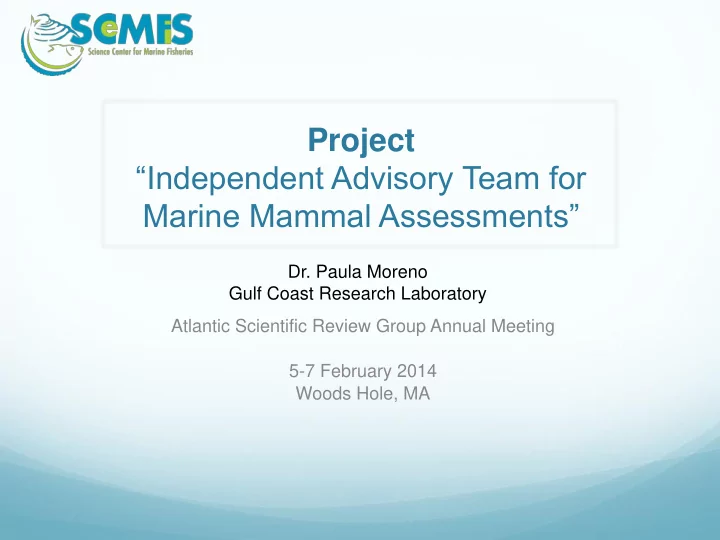

Project “Independent Advisory Team for Marine Mammal Assessments” Dr. Paula Moreno Gulf Coast Research Laboratory Atlantic Scientific Review Group Annual Meeting 5-7 February 2014 Woods Hole, MA
What is SCeMFiS? A National Science Foundation Industry/University Cooperative Research Center (I/UCRC) Academic-Industry Partnerships at NSF “I /UCRCs … a new era of partnership between universities and industry, featuring high-quality, industrially relevant fundamental research , strong industrial support of and collaboration in research and education” http://www.nsf.gov/eng/iip/iucrc/ SCeMFiS: first I/UCRC dedicated to fisheries research http://www.SCeMFiS.org
What is an Industry Partner? NSF considers an “Industry” Partner to be any: Private company - Publicly-traded company - Trade organization - Non-profit group - Government (federal, state, or local) agency - Academic Institutions: University of Southern Mississippi (Lead) Virginia Institute of Marine Science (Partner)
What is SCeMFiS? Center Rationale: Develop research essential for the sustainable management of shellfish and finfish resources Science Agenda Targets Bycatch Data Assessment Reduction Collection Modeling Sampling Fisheries Design Performance Management Strategy Evaluation
What is SCeMFiS? Current Research Portfolio: ~10 projects - Juvenile survey for Surf clams - Optimization of survey methodology for Black Sea Bass - Marine mammal independent advisory team SCeMFiS Science Components Assessment MM-Fisheries Modeling interactions Members Motivation : Support research leading to reduced uncertainty associated with some components of SA Research Motivation : Examine current technical challenges in estimating SA parameters and MM-fisheries interactions => Supplementary to SAR/SRG efforts
Supporting SA Needs Supplemental resources to address technical aspects PBR = N min * 0.5 R max * F r Examples of SAR Requirements for each Population Trends stock: Human-caused mortality/SI Stock structure: use of proxies (e.g., habitat, abundance) when insufficient biological information (Moore and Merrick, 2011) Abundance and PBR over broad areas: interpolation to fill gaps (e.g., survey coverage) (Moore and Merrick, 2011) Human-caused mortality/SI: identify fraction of stock range subject to highest level (Moore and Merrick, 2011)
Supporting SA Needs “… the ASRG recommends that NOAA Fisheries continue to explore alternative approaches to monitoring, particularly for species that are not amenable to traditional visual line transect surveys.” (Atlantic Scientific Review Group, 1 April 2013) “… the Commission recommended that the Service develop alternative strategies for collecting information on mortality and serious-injury levels in fisheries for which entanglements are difficult to detect or quantify using traditional observer programs.” (MMC Annual Report for 2010-2011)
New Opportunities: Big Data Era Vessel Monitoring System Yottabite Source: Fisheries and Oceans Canada http://www.nfl.dfo-mpo.gc.ca/e0010178
New Approaches and Modeling Advances
Project Goals Assemble SA expert team ✔ Strengthen team’s base knowledge of challenges in SA of marine mammal Atlantic stocks => seeking input from SRG, NMFS, MMC, TRTs, etc. Provide research recommendations to SCeMFiS’s science agenda
Research Team Paula Moreno (PI), Ph.D. in Wildlife & Fisheries Sciences (Texas A&M Univ.); Research Scientist (Univ. Southern Mississippi) John Brandon, Ph.D. in Aquatic & Fisheries Sciences (Univ. of Washington); Marine Stock Assessment Scientist André Punt, Ph.D. in Applied Mathematics (Univ. of Cape Town); Professor in the School of Aquatic and Fishery Sciences (Univ. of Washington) Randall Reeves, Ph.D. in Geography (McGill Univ.); Consultant Okapi Wildlife Assoc.; Marine Mammal Expert
Project Management and Evaluation Principal Researcher: Develops proposal; directs project; reports progress to Center. Point of contact for interested parties (Paula Moreno) Industry Liaison: Follows project progress and provides information to ensure project goals are met (Greg DiDomenico) NSF Evaluator: Independent professional evaluator assigned by NSF to ensure SCeMFiS performance consistent with high standards set by NSF (Donald Davis)
Big Data, but… “The data may not contain the answer. The combination of some data and an aching desire for an answer does not ensure that a reasonable answer can be extracted from a given body of data.. .” (Tukey, 1986) … also the Right Data & Methods This presentation is an account of work sponsored by the Science Center for Marine Fisheries (SCeMFiS) Source: Kellogg Magazine, Northwestern University
Recommend
More recommend